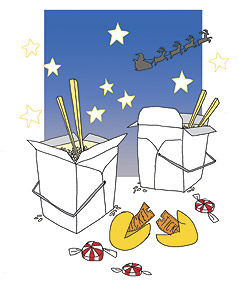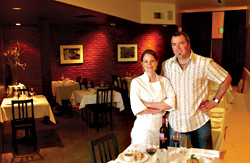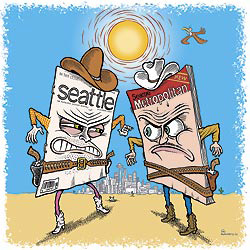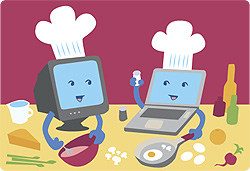I recently asked a childhood friend why Jewish families like ours eat Chinese food at Christmas. “Nothing else is open,” he replied, adding that he makes Christmas Eve reservations at Detroit’s premier Chinese restaurant, Peking House, up to a month in advance.
It may be impossible to know for sure how the tradition began; wiser heads than mine have given the matter plenty of thought. In a December 2004 column for Santa Monica’s LookOut News, Frank Gruber posits a theory I’ve heard before: “This old Jewish custom dates from when American culture was more monolithic, and the only people not celebrating Christmas were Jews and Chinese [immigrants]. It didn’t hurt that in many cities immigrant Jews lived in crowded neighborhoods near Chinatown and were willing to suspend the kosher laws to eat lobster Cantonese.” Whatever the custom’s origin, it’s widely understood to be a trope of modern Jewish life—often followed by a trip to the local cinema. In New York, the Jewish organization Makor has even solved the problem of having to sneak your chow mein into the multiplex; their Christmas movie night includes an all-you-can-eat Chinese feast, right in the theater.
If some foresighted mensch (good-hearted person) wants to start a similar event in Seattle, he is hereby encouraged to get off his tuchis (derriere) and do so. (Marketing tip: It wouldn’t appeal only to Jews. As fans of A Christmas Story know, the hapless—and decidedly un-Jewish—Parkers go out for Chinese after the neighbors’ dogs devour their Christmas turkey.)
Many local Chinese restaurants stay open on Christmas Day. Because it had been highly recommended, a few friends (one Jewish, two not) joined me recently for a test run at Bellevue’s Shanghai Cafe, owned by Taiwanese chef Ping Fu Su—whose brother, Hua-Te Su, owns Chinatown’s Shanghai Garden (and its sister restaurant in Issaquah).
Tucked into an unremarkable corner of Factoria Mall, Shanghai Cafe has framed color photographs of regional specialties on its walls. (Among them: “pork pump,” which L.A. Weekly food writer Jonathan Gold—whose knowledge of Asian food I often refer to—characterizes as “two pounds of Chinese braised hog lard with a fist-size lump of soft meat at the core”; it’s available at the restaurant for $12.95.) It’s a casual place, yet Su’s more formal past as a banquet chef at Taipei’s high-end Howard Plaza Hotel is evident in the hands-on service. Our golden mushroom, black moss, and black mushroom soup ($6.50) was ladled, tableside, for us into four small bowls; when the moo shu vegetables ($8.95) arrived, our server dabbed hoisin sauce onto each thin pancake, added some of the vegetable mixture, and produced four perfectly proportioned wraps. (It’s a particularly welcome service for moo shu fans who habitually settle for their own sloppy handiwork.)
All the graceful moves in the world matter little, of course, if the food isn’t up to snuff, but we couldn’t find a weak link. The soup was the blandest thing we tried, but that’s almost certainly by design; it’s more about texture than flavor. The slender enoki mushrooms (also called golden mushrooms), meaty chunks of shiitake, and seaweedlike moss that swam through the thick-but-not-gluey broth provided a soothing introduction to the meal’s bigger flavors. An appetizer called “vegetarian goose” ($4.50, and perfect for Christmas!) consists of paper-thin tofu “skin” wrapped around julienned shiitake mushrooms and firmer tofu—and, oddly, is served cold. Odd or not, its nutty flavor and chewy consistency became addictive; the “goose” may not resemble real poultry, but it makes a nice starter—and a nice conversation starter.
If you’ve never had hand-shaved barleygreen noodles ($8.95), be warned: Their bright green color is somewhat shocking. They’re also thick, irregularly shaped, and satisfyingly doughy, and at Shanghai Cafe they’re served with plenty of egg in addition to whatever meat you add (if any). Chicken and jellyfish ($8.95), another oddball choice, proved memorable, if not necessarily worth repeating. The clean, distinctive bite of cilantro livened up the chicken and cut the sea flavor of the jellyfish, which came in thin, gelatinous strips (and which not everyone cared for). Still, Shanghai Cafe is close to ideal for a festive dinner, inasmuch as it dodges typical Chinese-food pitfalls like over-salted moo shu and quantity used in place of quality.
What to do after dinner? Well, Factoria Mall does have a multiplex. Maybe you can sneak some fortune cookies in for dessert.
Shanghai Cafe, 12708 S.E. 38th St., 425-603-1689, BELLEVUE. 11 a.m.–9:30 p.m. Sun.–Thurs.; 11 a.m.–10:30 p.m. Fri.–Sat. Other recommended Chinese restaurants open on Christmas Day: Chiang’s Gourmet, 7845 Lake City Way N.E., 206-527-8888, LAKE CITY; Shanghai Garden, 524 Sixth Ave. S., 206-625-1688, CHINATOWN/ INTERNATIONAL DISTRICT; Imperial Garden Seafood Restaurant, 18230 E. Valley Hwy., 425-656-0999, KENT.








